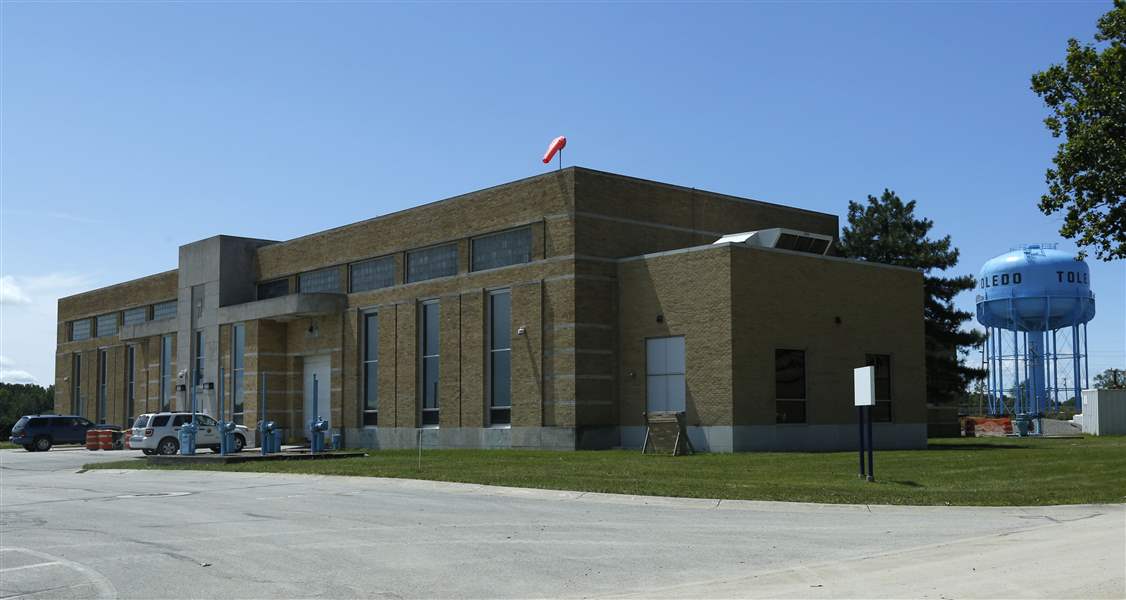
Toledo councilman offers details about alternative water proposal
5/15/2018
High service pump station which distributes water throughout the city at the Collins Park Water Treatment Plant in Toledo.
The Blade/Lori King
Buy This Image
Toledo City Councilman Gary Johnson said the solution to regional water likely will allow Toledo to keep its water treatment plant, establish a nine-member advisory board, and give Toledo City Council vetoing power over water rates.
Mr. Johnson said those are details of an alternate regional water plan Toledo Mayor Wade Kapszukiewicz is pitching to suburban leaders, but the mayor said Tuesday that Mr. Johnson doesn’t speak for him and “doesn’t have all his facts correct.”
Mr. Kapszukiewicz declined to comment on the specifics of his alternate proposal.
“I’m not going to publicly speak on the plan right now. Very soon we’re going to be in a position to release our plan. We’re just a couple days ahead of that, but we’re going to talk about it on a timeline that makes sense for us,” he said. “Hopefully Gary’s misplaced enthusiasm doesn’t torpedo the entire deal.”
Mr. Johnson said he believes the plan is something that will work for both Toledo and suburban water users, and he is “willing to go out and sell it.”
“I don’t think I would say anything that is going to hurt negotiations. I feel comfortable talking to people about it,” he said.
The mayor confirmed he met with Mr. Johnson and is meeting with all members of council to provide an update on the negotiations with his suburban counterparts. He said he has met with seven of the 12 council members so far and added that he did not expect Mr. Johnson to speak publicly about what they had discussed.
“I know he has angered his colleagues on city council who see this as yet another example of him speaking before he has his facts,” Mr. Kapszukiewicz said.
According to Mr. Johnson, the mayor’s proposal would allow Toledo to retain ownership of its Collins Park Water Treatment plant and have two votes on the advisory board. The other participating municipalities would each have one vote, a change from earlier regional water proposals that called for a seven-member board with some suburban representatives sharing votes.
Critics of previous plans contend Toledo needs a majority vote on the board because its customers use the most water, but Mr. Johnson said he believes the new set-up looks out for Toledoans because of a key provision: Toledo City Council will have the power to veto water rates they deem unacceptable.
Mr. Johnson acknowledged the framework could still change but said he is hopeful the deal will be finalized soon.
“I think people feel a sense of fairness,” Mr. Johnson said. “The big concern for most Toledoans was the selling of our water treatment plant. That’s no longer an option under this plan, and I think they feel a sense of relief.”
Councilman Nick Komives, who chairs the water quality and sustainability committee, said the mayor’s administration has kept council informed but no proposals have been submitted in writing to the body. He said he is optimistic that the administration is working closely with its suburban partners, but the details are not yet set in stone.
“Some of the details of the proposal are shared with us, but certainly everything is in discussion mode. So at this point, nothing is for certain as the mayor continues to talk with the member customer communities,” he said.
Toledo and the eight municipalities that buy its water have been working toward establishing a regional water system for months, long before Mr. Kapszukiewicz took office. Lucas County, Perrysburg, Maumee, Sylvania, Whitehouse, Fulton County, Monroe County, and the Northwestern Water and Sewer District all are considering joining the regional system.
In May, 2017, the Toledo Regional Chamber of Commerce hired a consultant to help the parties form the Toledo Area Water Authority. The plan was to create a new political subdivision under state law, and that new entity would own and operate Toledo’s Collins Park Water Treatment Plant, set rates, and manage infrastructure improvements.
But the latest plan abandons the notion of forming a new political body in favor of forming a regional water advisory board instead.
Mr. Johnson said he hopes the board will be comprised of each municipality’s public utilities director so that industry experts will be the ones setting water rates.
The current framework Mr. Johnson said is being discussed would establish a retail rate for Toledo customers. Suburban communities that buy wholesale water from a master meter, such as Sylvania and Perrysburg, would receive a 10 percent discount off the Toledo rate. Bulk customers such as Toledo Refining Company and Cleveland-Cliffs Inc. would receive a 15 percent discount, Mr. Johnson said.
Mr. Johnson said the rate structure won’t result in Toledoans paying more for their water than their suburban counterparts because those municipalities likely will add their own surcharges on to their residents’ water bills. Those surcharges would be to cover their costs of delivering water, maintaining infrastructure, and billing.
“They do have costs of getting that water from the master meter to their customers,” Mr. Johnson said.
It is unclear whether establishing an advisory board would need a citizen vote to change Toledo’s charter to allow a new body to set water rates. Mr. Komives said the city’s legal team is researching the issue.
Contact Sarah Elms at selms@theblade.com, 419-724-6103, or on Twitter @BySarahElms.